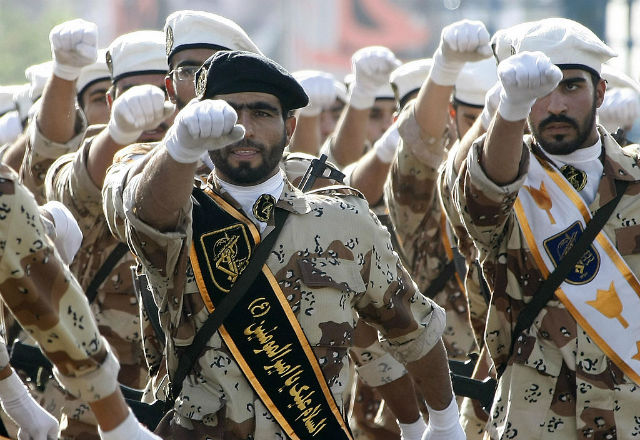
The man likely to become al Qaeda’s next leader has spent decades using Iran as a base of operations and maintains deep ties to the hardline regime, signaling that two of the globe’s leading terrorist forces could exponentially expand relations in the near future.
Saif al-Adel, al Qaeda’s number two leader and longtime head of its security arm, fled to Iran in the early 2000s, along with other senior leaders, following the September 11 attacks. From there, he helped relay orders from the just-killed al Qaeda leader Ayman al-Zawahiri and orchestrate terrorist operations that killed dozens of people, including Americans, according to former U.S. officials and information on the Iran-al Qaeda axis published by a watchdog group.
Iran’s Islamic Revolutionary Guard Corps (IRGC) protected al-Adel during his time in the country, and the regime permitted him to plan deadly terror attacks, including a May 2003 operation in Saudi Arabia that killed eight Americans. “Adel’s suspected presence in Iran has raised further questions regarding Iranian influence on al Qaeda if Adel were to be named leader,” according to United Against Nuclear Iran (UANI), an advocacy group that closely tracks Iran’s regional terror operations.
These ties have only deepened since President Joe Biden’s bungled withdrawal from Afghanistan that left the Taliban in power and the country in shambles. Senior leaders in Iran’s Quds Force, an elite IRGC branch, remain in close contact with al Qaeda leaders, “and since the fall of Afghanistan, have provided some al Qaeda leaders with travel documents and safe haven,” according to a European intelligence analysis. The Iran-al Qaeda alliance, former U.S. officials told the Free Beacon, has quietly grown for many years, making the prospect of a new nuclear deal with Iran—which will provide Tehran with billions in cash—beneficial for its allies in al Qaeda.
“When the U.S. government enriches Iranian terrorists through sanctions relief or a lack of enforcement, that money ultimately goes back to support al Qaeda,” Gabriel Noronha, a senior Iran adviser for the State Department during the Trump administration, told the Free Beacon. “We know that Saif al-Adel has not just been living in Iran for most of the past 20 years—he’s been hosted there by the regime along with other al Qaeda operatives. Since 2015, the Iranian regime has allowed al Qaeda to establish an operational headquarters in the country, providing them with documents, passports, funding, and logistical support like safe houses.”
Al-Adel and his network of al Qaeda confidants used their time in Iran to build close “operational coordination” with Tehran’s security forces, including the IRGC. While Iran was once at odds with al Qaeda due to religious differences, that has not been the case for many years now, according to Noronha and other former U.S. officials familiar with these ties.
“These are not totally separate and distinct terrorist groups or even rivals anymore—they are part of an anti-American and anti-Western alliance,” Noronha said.
From his perch in Iran during the mid-2000s, al-Adel “was allowed by Iran to travel to Pakistan and open more contacts with other al Qaeda leaders,” according to UANI’s research, which is based on intelligence and open-source reporting. Iran’s decision to permit al-Adel and other al Qaeda operatives to freely move in the region “opens up speculation that al-Adel could establish a ‘satellite office’ for the group in Iran,” according to a 2011 AP report.
Nathan Sales, former U.S. ambassador-at-large and coordinator for counterterrorism, told the Free Beacon that “contrary to expectations and contrary to conventional wisdom, the Iranian regime and al Qaeda have maintained a mutually beneficial relationship for many years.”
Iran, Sales noted, recently hosted senior al Qaeda leaders and operatives, “which is exactly what we should expect from the world’s worst state sponsor of terrorism.”
The depth of these ties was first unveiled by former secretary of state Mike Pompeo in January 2021, when he disclosed publicly that a U.S. operation killed one of al Qaeda’s top leaders on the streets of Tehran in 2020.
“Al Qaeda has a new home base: the Islamic Republic of Iran,” Pompeo said in a speech at the time, marking one of the first public disclosures about Iran’s deepening relationship with the terror group.
Hans-Jakob Schindler, a senior director at the Counter Extremism Project, which tracks jihadi groups, noted that al-Adel “has become very high value” since al-Zawahiri was killed, “and the Iranians usually take advantage of such situations.”
Al-Adel’s “existence in Iran and his freedom to act while in Iran will solely depend on what the Iranian regime think his value and usefulness for their aims is,” Schindler said.